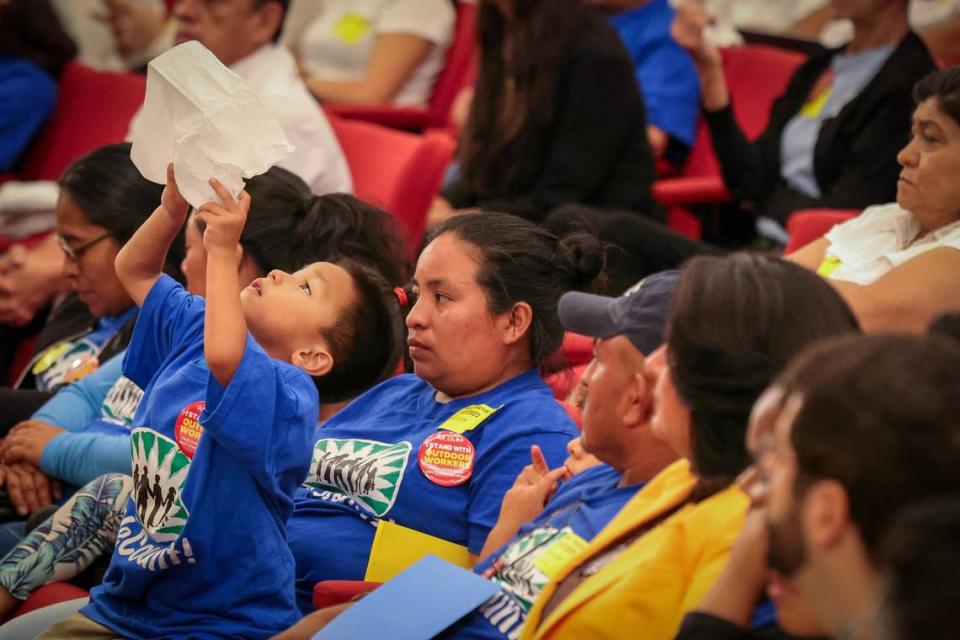Miami-Dade puts off decision on heat protections for outdoor workers after industry pressure
After the hottest summer on Earth, Miami-Dade County Commissioners on Tuesday punted on a landmark proposal intended to increase protections for outdoor workers and enforce those protections with fines and penalties.
A tense back and forth on the commission dais made clear that a majority of commissioners didn’t support the bill for a range of reasons. Some didn’t support the creation of additional county jobs and costs to jobs to enforce new rules. Some said they didn’t think the regulations would cover enough people. But the key objection was that mandating regular water breaks and other measures amounted to unnecessary red tape and regulation of the politically influential agriculture and construction industries, which packed the room with supporters and led an intense campaign against the bill.
“This is an overreaching and outrageous heat sanction on only two industries,” said Commissioner Danielle Cohen Higgins. “This ordinance could potentially kill industry.”
The proposed bill, which passed on first reading in September, would have required employers in the agriculture and construction industry to provide water, rest and shade to their outdoor employees or face financial penalties. Enough penalties and the employer would be forbidden from taking on lucrative county contracts.

Commissioners voted 8 to 2 to defer the bill — for a second time — on Tuesday. Under Miami-Dade rules, if it is deferred again when it returns in March, it would die and have to be re-introduced from scratch.
Several commissioners speaking against the bill also suggested that even if something did pass, the state would probably block it anyway during the next legislative session in Tallahassee.
“I can almost guarantee that if anything is done here the state is going to weigh in,” said Juan Carlos Bermudez, commissioner for district 12.
The vote followed a multi-year campaign for heat protections largely led by WeCount!, a South Florida advocacy group primarily representing farm workers, that has drawn national headlines and social media attention from celebrities, including Mark Ruffalo.
As it stands, there are no specific laws in Florida mandating water, rest and shade for outdoor workers. The Occupational Safety and Hazard Administration (OSHA) does recommend that employers provide those things, and it levies fines when workers die on the job due to heat stress.
In 2020, the administration stepped up its enforcement of the guidelines it suggests. That led to an uptick in more visits to outdoor workplaces. Cohen Higgins, who opposed additional regulation, pointed to an $81,919 fine OSHA levied on a Florida sugarcane grower in 2021 for providing no shade during extremely hot work days.
OSHA is working on a federal rule to protect outdoor workers nationwide, but it could be years before even the draft rule is introduced, much less enforced.
But workers and advocates say that that’s not enough protection during summers that are getting hotter.
They cite stories from outdoor workers, especially undocumented people, who have been discouraged or even punished for taking breaks or drinking water. Studies have found Florida farm workers to be chronically dehydrated, sometimes to the point of medical distress, on the job.
Other states, including Oregon, Minnesota, Colorado and Washington have heat standard protections for outdoor workers. California adopted an outdoor standard nearly two decades ago and is now working on one for indoor workers, like warehouse employees.
However, some employers in South Florida’s agriculture and construction industries said they already provide water, shade and rest to their employees and don’t need new oversight, which they derisively call the “heat police.”
Instead, these groups have pushed to shape the bill into one that focuses on educating employees and employers on how to stay safe during the hottest days of the year, with informational posters and workshops.
“We take great pride in training our employees, providing the safest work environment,” said Nelson Stabile, president of the Business Association of South Florida. “We just want to make sure that we can continue raising awareness without having a situation where it’s overly punitive and there’s duplicative regulatory government in place.”
A similar bill in Tallahassee, which suggests that employers provide water, rest and shade to employees with no penalties if companies choose not to, failed under industry pushback and lack of political support for the last three years in a row.
Initiatives in other states, like Nevada and Texas, have faltered under pressure from employers. In Nevada earlier this year, after negotiations with industry representatives pushed the threshold for protections up to 105 degrees, the bill died. In Texas, cities including Austin passed water and rest requirements for outdoor workers, but the state pre-empted the protections and undid them.
After the Miami-Dade bill passed on first reading in September, industry pushback intensified.
Under a commissioner’s request, lobbyists from agriculture and construction met with WeCount! to hash out a compromise bill. The result was a watered-down version of the original bill, covering employees for an average of 5 days a year, instead of throughout the summer, with fewer fines and fewer employers in line to receive them.
In one of its communications ahead of Tuesday’s vote, the Associated General Contractors of South Florida urged supporters to ‘FIGHT BACK!’ against the bill by calling the mayor or commissioners, or by contributing financially to a potential lawsuit against the county. Earlier this year, Florida made a new law allowing businesses to sue local governments for policies that impact a business’s profits.
“Your financial contribution will go into fighting this overreach at the county commission, by lobbying for preemption at the state level, and by preparing for a legal challenge. Members who contribute to our effort will receive insider updates on our progress throughout our battle to defeat this ordinance,” the statement read.

